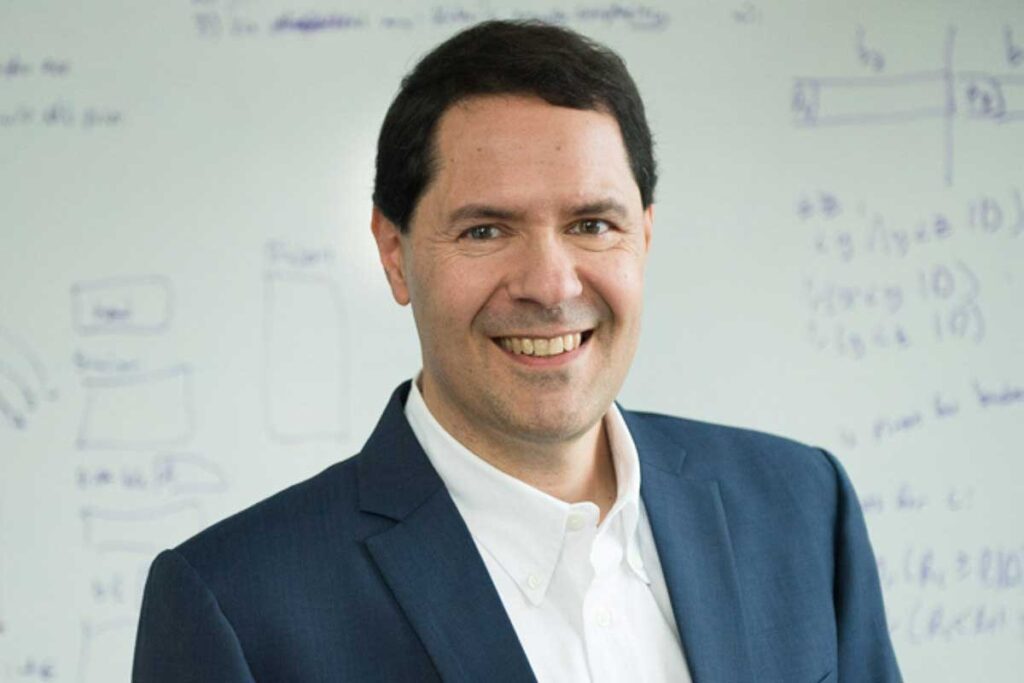Khoury professor Javed Aslam appointed as Northeastern’s inaugural AI chief
Author: Emily Spatz
Date: 11.06.24

Northeastern University has announced that Khoury professor Javed Aslam will serve as the university’s inaugural chief of artificial intelligence, working to promote AI innovation, literacy, and adoption in all sectors of the university.
“With extensive AI experience in both academia and industry, Jay is well-positioned to excel in this new role,” wrote David Madigan, Northeastern’s provost and senior vice president for academic affairs, in the announcement. “As a professor in the Khoury College of Computer Sciences, his research has focused on AI and its implications, including machine learning, informational retrieval, natural language processing, and health care.”
Aslam, who assumed the role on October 1, said he has plans to expand AI learning offerings for students, increase both the research of AI and its application in interdisciplinary research, and streamline the use of AI in university operations.
“AI can be used in most any place,” Aslam said. “The question, then, is what is the best way to leverage AI? How do we manage disparate efforts that are already happening across the university and determine which efforts to start up?”
Aslam’s expertise in the field stretches back decades and extends beyond academia, putting him in an ideal position to lead the university in the rapidly evolving AI field. He describes himself as an “AI researcher from the very beginning of my career,” having received a doctoral degree in machine learning from the Massachusetts Institute of Technology in 1995.
Outside of his academic work, Aslam has dedicated most of the last five years to launching his AI-powered health care company, CodaMetrix. The company provides autonomous medical coding for premier health organizations including Mayo Clinic, Mass General Brigham, and Mount Sinai.
“Starting the company has been an eye-opening experience — seeing how AI can be applied in the real world, on real-world data, which is oftentimes messy and noisy,” Aslam said. “A lot of what we do at the university is interdisciplinary use-inspired research and having both the academic experience in AI and the applied experience at a company is incredibly useful.”
Aslam’s goals for the position are focused in three areas: research, literacy, and university operations.
AI and research
In the research field, Aslam sees potential for Northeastern to increase AI innovation and use AI to bolster disciplinary research.
“We have incredibly strong research faculty and research groups in core methodologies as well as AI policy, responsible AI, among other areas,” he said. “One of the things we want to do is build on those initiatives to really lead as a university in those areas through targeted hiring and providing the resources these researchers need to thrive.”
Specifically, Aslam plans to formulate a university-level strategy to obtain the compute infrastructure — the computational resources needed for AI to perform tasks — for cutting-edge research in areas such as large language models. Computes in areas like these are in high demand and are difficult to come by, Aslam said.
Outside of studying AI itself, Aslam also plans to promote collaboration between core AI researchers and disciplinary researchers in fields such as humanities, business, and health care. Another initiative involves building targeted AI models that disciplinary researchers can use to “supercharge” their endeavors.
“We want to leverage our strengths in interdisciplinary and use-inspired research, and we want to enable AI-powered research across the university,” Aslam said.
AI in the classroom
For students, the creation of Aslam’s role means a planned increase in AI-specific program offerings, including minors and certificates.
“We want to build core AI courses for all students so that everybody will come out being literate in AI — both in what AI is capable of and what it’s not capable of — and how to use AI appropriately,” Aslam said, adding that such skills will be necessary for students on co-op and post-graduation.
Another major goal for Aslam is the creation of a personal AI assistant for students. The assistant wouldn’t replace traditional advisors, but would offer customized, tailored information for students’ co-op and educational goals using data about university offerings and students’ individual interests and strengths.
“I very much believe in having a human in the loop, but AI is an assistant,” Aslam said. “It allows you, in real time, to get some intriguing thoughts and advice and then you can say, ‘Aha, this might be interesting for me. I should go talk to somebody about that.’”
AI and university operations
The third prong of Aslam’s plan involves expanding and streamlining the use of AI in university operations. That includes leveraging available data to optimize university functions like hiring and admissions.
“I’m in the provost’s office because this is a university-wide initiative, so I’ll be working with people across the university,” he said, adding that Northeastern has created an AI council, composed of leaders throughout the university, that he meets with weekly to discuss objectives.
Aslam emphasized that the university’s goal is not to replace people with AI, but to allow students to become literate in the emerging technology and optimize university functions with AI as a tool.
“There’s AI, and then you want to tie it to people,” Aslam said. “This is one aspect of human-in-the loop AI; it’s not necessarily that AI is going to replace people, but AI can be an incredible tool that people can use.”